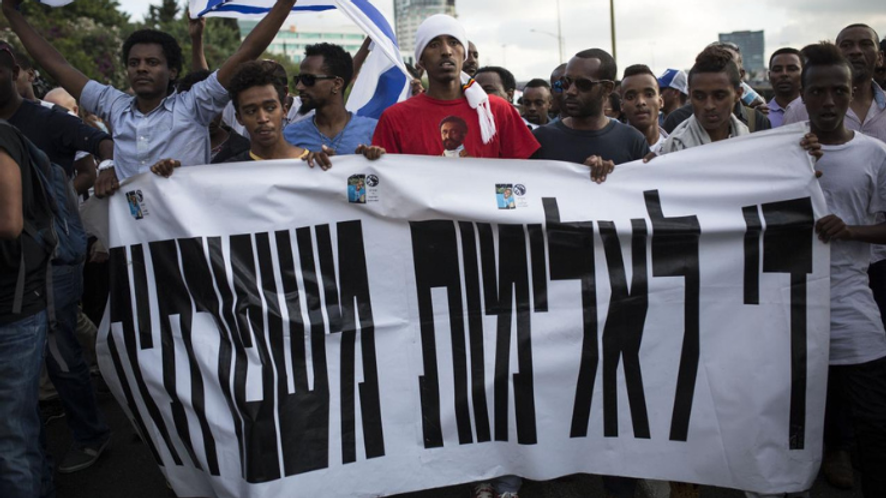In Israel it is Too Easy for Police to Make Arrests
- ACRI
- May 24, 2018
- 4 min read
Updated: Dec 18, 2019

The release of 21 demonstrators in Haifa reminds us once more how easy it is for police to arrest citizens. It’s frightening to think that in most cases, when there is no media attention, many people end up spending a night behind bars.
Anne Sucuio
Last week’s arrest of protestors in Haifa reminded me of the unnecessary and widely publicized 2010 arrests of 17 demonstrators in Sheikh Jarrah, among them ACRI’s CEO. Then, too, the police claimed that the demonstrators had participated in an illegal protest and had attacked police officers. Then, too, after 36 hours of detention, the court found that the arrest warrants issued were false, released the detained protestors immediately, and harshly criticized the police for their actions.
Anyone familiar with the data knows that over the years police have easily and hastily make arrests. According to the police’s annual statistics, in the past decade there has been a 30% increase in the total number of arrests (60,805 in 2016 as compared with 45,884 in 2006), only half of which resulted in an indictment.
Last week, the ease with which police negate the value of an individual’s freedom was proven once again. Twenty-one demonstrators were arrested in Haifa while protesting the army’s use of live-fire towards demonstrators on the Gaza border. Two of those detained were released soon after, but the remaining nineteen were detained for a full two and a half days before the court released them. The police claimed, amongst others, that the detainees had assaulted officers and purposefully damaged official property. However, when the case came to court, the judge surprisingly found that these accusations were “mistaken,” a result of the arrests requests. There was no official claim of property damage and most of the protestors were not accused of assaulting a police officer.
As with similar scenarios, this situation reminds us how easily and recklessly the police use extreme measure of detention, in complete contradiction to its legal purpose. The law dictates that a suspect can only be held for investigative purposes prior to an indictment in extreme situations, such as suspected danger or disruption to the investigation.
In this case, Judge Amir Salamah released the prisoners and remanded the police about the basic principles of arrest: “The purpose of arrest is neither punishment nor deterrence when the arrest or the alternative to arrest must correspond with the investigation, the investigatory needs, and the purpose of arrest. Without any suspicion of disruption and in the absence of danger, there is no reason for detention or an alternative detention.”
It is troublesome to think of what happens in regular cases, in which the judge has only a few minutes per case to decide whether or not to extend detention, and with neither the strong media and public responses, nor interventions by civil society organizations like that which was led by Adalah in this case.
Ofra Kelinger, the prison services commissioner, joined the choir of critics on detention policy saying in an interview with the daily Yediot Aharonot, “There are 52,000 arrests each year, half of which end without any legal process. We are using arrests as a goal in and of itself… the previous police chief’s policies were to arrest for the sake of deterrence. The idea was that everyone is a criminal, and there is a need for as many arrests as possible. Although the current police chief has a different approach, the issue of arrests has not changed.”
The number of arrests in Israel is not inevitable; rather, it is a direct result of the policies held by the police and the prosecution. One case in point is the “Turning Point” program, established by former police chief Yohanan Danino. This program tied success of a police station to the number of detentions prior to and during trials. This caused a dramatic increase in arrests.
In addition to the fact that these policies both violate personal freedom and leave a scar for lifetime on those arrestees who spent one night to many years in jail, the jail conditions themselves are illegal. For at least two months, the state has violated the High Court of Justice’s injunction to provide a minimum living space of at least 3 square meters to every prisoner and detainee, effective March 2018 (with an extension to 4.5 square meters effective December 2018).
Detainees, even those without an indictment are held in conditions more crowded and worse than those of prisoners. In many countries, these conditions are below the minimum threshold and would be considered as cruel and inhumane punishment. The High Court of Justice also recommended decreasing the number of arrests as a method to alleviate the overcrowding, stating that “the legislator’s message is that arrest is the last option in a chain of possible steps that enforcement agencies can take. This message must be implemented. Implementation can also help decrease the number of arrests and therefore expand the amount of living space for those arrestees for whom arrest is the only option.”
The time has come to fix this serious abuse of authority that has developed and grown over the past decades and has led to a steep increase in the number of arrests. It is about time that the police instill among its officers the idea that detention and the corresponding deprivation of freedom should be the last resort in the police toolbox.
This article was originally published in Yediot Aharonot on May 25, 2018.








